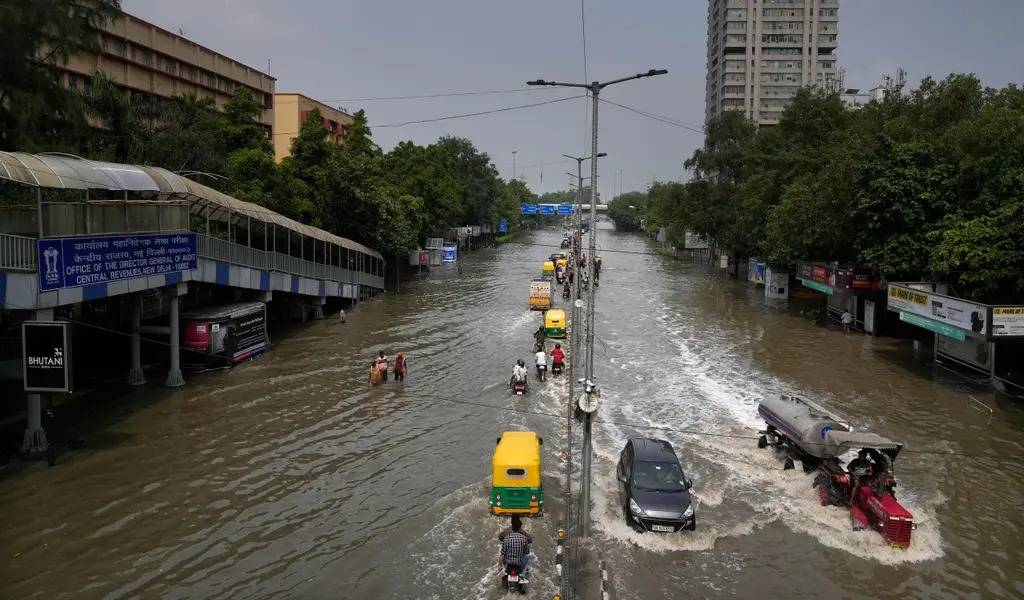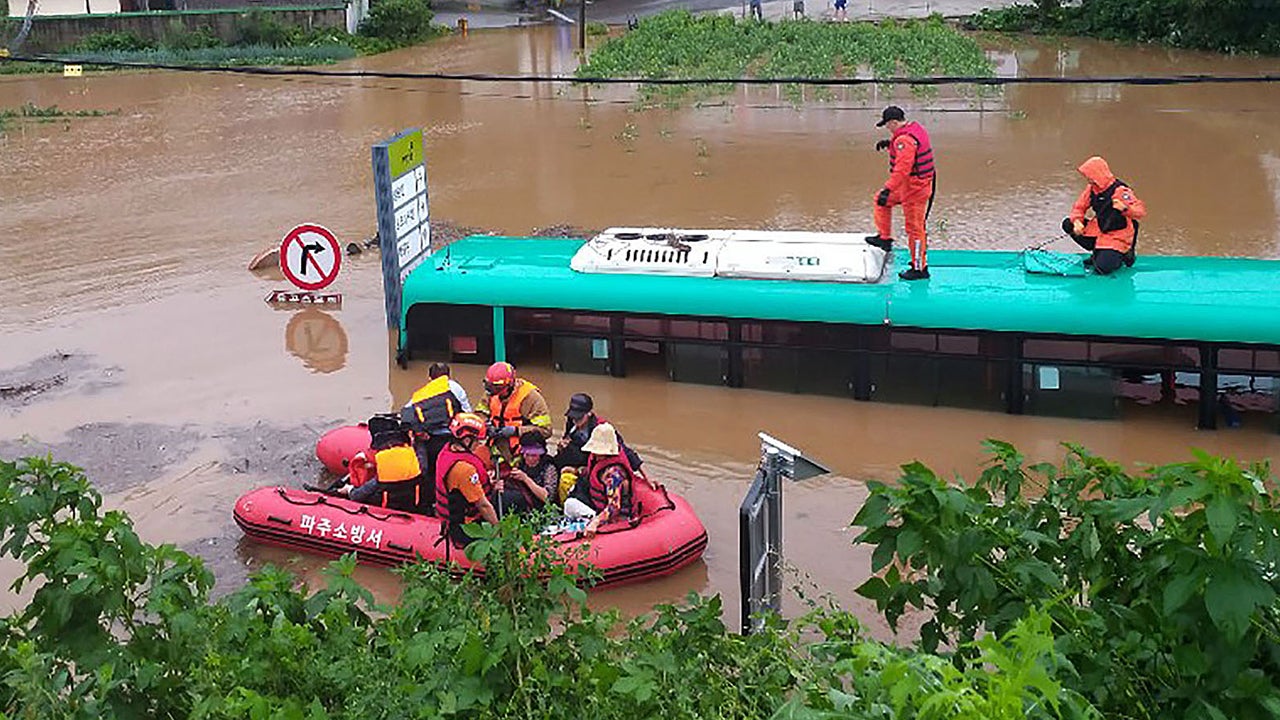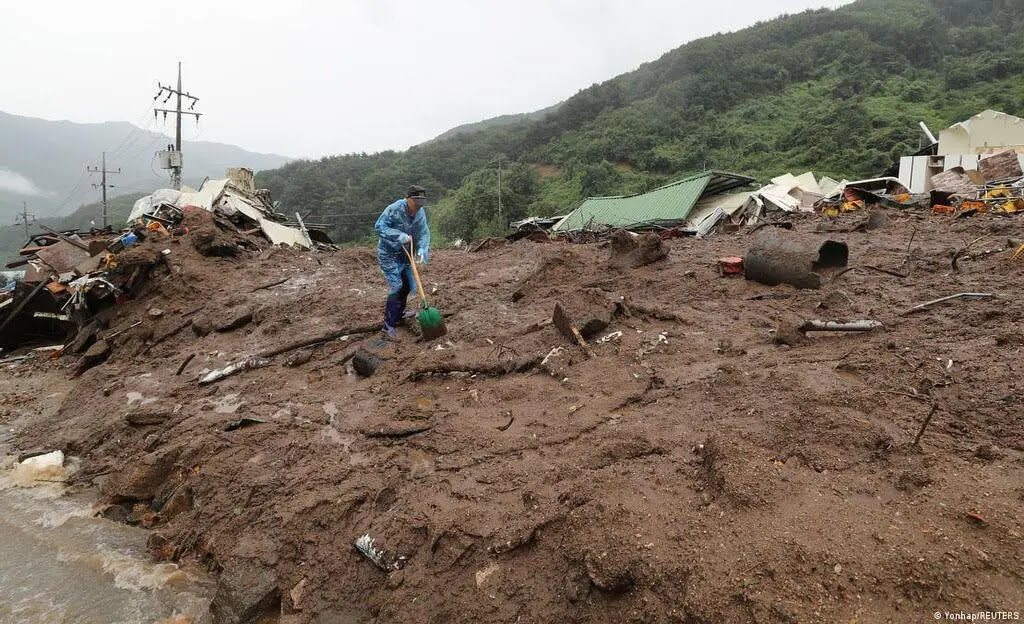News
Extreme Weather And Flooding In Korea, Japan, China, And India: Understanding The Impact
(CTN NEWS) – Extreme weather events and flooding have become increasingly common in various parts of the world, causing widespread devastation and posing significant challenges for affected regions.
In recent news, a series of floods have been reported in Korea, Japan, China, and India, highlighting the urgent need to address the impact of climate change on these countries.
This article delves into the causes and consequences of extreme weather and flooding in these regions, while also exploring potential solutions and mitigation strategies.
Extreme Weather and Flooding: The Devastating Consequences
Flooding and extreme weather events have severe consequences for the affected regions. The destruction caused by these events impacts infrastructure, agriculture, and human lives.
It is essential to understand the underlying causes to develop effective strategies for prevention and mitigation.

The Link between Climate Change and Extreme Weather
Global climate change plays a significant role in the occurrence and intensity of extreme weather events.
Rising global temperatures lead to changes in weather patterns, resulting in increased frequency and severity of storms, hurricanes, and heavy rainfall.
Impact on Infrastructure and Economy
Extreme weather events, including flooding, wreak havoc on infrastructure, leading to disruptions in transportation, communication, and power supply.
Roads and bridges get damaged, buildings collapse, and critical utilities are compromised.
These events also have a significant economic impact, causing substantial losses in terms of property damage, business interruptions, and increased recovery costs.
Agricultural Challenges and Food Security
Floods can decimate agricultural lands, destroying crops and livestock. This not only affects the livelihoods of farmers but also poses a threat to food security in the affected regions.
Loss of arable land, contamination of water sources, and disruption of supply chains can lead to food scarcity and rising prices.
Threat to Human Lives and Safety
Perhaps the most devastating consequence of extreme weather and flooding is the loss of human lives. These events result in casualties, displacements, and injuries.
Vulnerable communities are at a higher risk, as they often lack adequate infrastructure and resources to withstand and recover from such disasters.

Understanding the Recent Floods in Korea, Japan, China, and India
The recent floods in Korea, Japan, China, and India have been a cause for concern, drawing attention to the urgent need for preparedness and resilience in the face of extreme weather events.
Let’s delve into the specifics of each region and understand the impact of these floods.
Korea
Korea experienced severe flooding in several regions, including Seoul, due to heavy rainfall and overflowing rivers. The floods led to landslides, road closures, and significant damage to infrastructure.
The government and local communities worked together to rescue stranded individuals and provide relief efforts to affected areas.
Japan
Japan, no stranger to natural disasters, faced devastating floods in various prefectures. Heavy rainfall caused rivers to burst their banks, resulting in landslides and destruction of homes and infrastructure.
The Japanese authorities swiftly mobilized rescue operations and implemented evacuation measures to ensure the safety of citizens.
China
China witnessed catastrophic flooding, primarily in the Yangtze River basin, affecting millions of people. Heavy rainfall combined with rapid urbanization exacerbated the impact.
The floods caused massive property damage, displacement of residents, and loss of lives. The Chinese government launched extensive relief and recovery efforts to assist the affected population.
India
India, a country prone to both monsoonal and flash floods, faced significant flooding in several states. The floods caused landslides, destruction of homes, and disruption of essential services.
Rescue operations were initiated to save lives and provide relief materials to affected communities.

Strategies for Mitigating the Impact of Extreme Weather and Flooding
Addressing the impact of extreme weather and flooding requires a multi-pronged approach that focuses on prevention, preparedness, and resilience.
Here are some strategies that can be implemented to mitigate the impact of these events:
1. Enhancing Early Warning Systems
Investing in robust early warning systems can help alert communities in advance, allowing for timely evacuations and preparation.
These systems should be supported by effective communication channels to ensure the dissemination of alerts and information.
2. Implementing Climate-Resilient Infrastructure
Constructing infrastructure that is designed to withstand extreme weather events is crucial. This includes building flood-resistant buildings, improving drainage systems, and reinforcing critical facilities such as hospitals and schools.
3. Strengthening Disaster Risk Reduction Measures
Integrating disaster risk reduction measures into development planning can minimize vulnerabilities.
This involves conducting risk assessments, implementing land-use regulations, and promoting ecosystem-based approaches to reduce the impact of floods.
4. Promoting Sustainable Agricultural Practices
Encouraging sustainable agricultural practices can help minimize the impact of flooding on crops and livestock.
Techniques such as contour plowing, terracing, and agroforestry can help retain water, prevent soil erosion, and improve overall resilience.
5. Enhancing International Cooperation
Collaboration among countries and international organizations is crucial for sharing knowledge, resources, and expertise.
By working together, nations can develop effective strategies and policies to combat the impact of extreme weather and flooding.
6. Raising Public Awareness and Education
Educating the public about the risks associated with extreme weather events and flooding is essential.
Promoting awareness campaigns, providing training on emergency preparedness, and encouraging community participation can enhance resilience and reduce the loss of life and property.
Conclusion
The recent floods in Korea, Japan, China, and India have underscored the urgency of addressing the impact of extreme weather events.
By understanding the causes, consequences, and potential solutions, we can work towards developing strategies that mitigate the devastation caused by flooding and build more resilient communities.
It is imperative that governments, communities, and individuals collaborate to tackle the challenges posed by climate change and ensure a safer future for all.
RELATED CTN NEWS:
Iowa Judge Temporarily Halts Abortion Ban, Allowing Legal Battle To Unfold
Carbon-Emission-Free Aviation: An Ambitious ‘ZeroAvia’ Plan For Commercial Flights By 2025
Record-High Youth Unemployment In China Signals Struggling Post-Pandemic Recovery

News
Google’s Search Dominance Is Unwinding, But Still Accounting 48% Search Revenue

Google is so closely associated with its key product that its name is a verb that signifies “search.” However, Google’s dominance in that sector is dwindling.
According to eMarketer, Google will lose control of the US search industry for the first time in decades next year.
Google will remain the dominant search player, accounting for 48% of American search advertising revenue. And, remarkably, Google is still increasing its sales in the field, despite being the dominating player in search since the early days of the George W. Bush administration. However, Amazon is growing at a quicker rate.
Google’s Search Dominance Is Unwinding
Amazon will hold over a quarter of US search ad dollars next year, rising to 27% by 2026, while Google will fall even more, according to eMarketer.
The Wall Street Journal was first to report on the forecast.
Lest you think you’ll have to switch to Bing or Yahoo, this isn’t the end of Google or anything really near.
Google is the fourth-most valued public firm in the world. Its market worth is $2.1 trillion, trailing just Apple, Microsoft, and the AI chip darling Nvidia. It also maintains its dominance in other industries, such as display advertisements, where it dominates alongside Facebook’s parent firm Meta, and video ads on YouTube.
To put those “other” firms in context, each is worth more than Delta Air Lines’ total market value. So, yeah, Google is not going anywhere.
Nonetheless, Google faces numerous dangers to its operations, particularly from antitrust regulators.
On Monday, a federal judge in San Francisco ruled that Google must open up its Google Play Store to competitors, dealing a significant blow to the firm in its long-running battle with Fortnite creator Epic Games. Google announced that it would appeal the verdict.
In August, a federal judge ruled that Google has an illegal monopoly on search. That verdict could lead to the dissolution of the company’s search operation. Another antitrust lawsuit filed last month accuses Google of abusing its dominance in the online advertising business.
Meanwhile, European regulators have compelled Google to follow tough new standards, which have resulted in multiple $1 billion-plus fines.

Pixa Bay
Google’s Search Dominance Is Unwinding
On top of that, the marketplace is becoming more difficult on its own.
TikTok, the fastest-growing social network, is expanding into the search market. And Amazon has accomplished something few other digital titans have done to date: it has established a habit.
When you want to buy anything, you usually go to Amazon, not Google. Amazon then buys adverts to push companies’ products to the top of your search results, increasing sales and earning Amazon a greater portion of the revenue. According to eMarketer, it is expected to generate $27.8 billion in search revenue in the United States next year, trailing only Google’s $62.9 billion total.
And then there’s AI, the technology that (supposedly) will change everything.
Why search in stilted language for “kendall jenner why bad bunny breakup” or “police moving violation driver rights no stop sign” when you can just ask OpenAI’s ChatGPT, “What’s going on with Kendall Jenner and Bad Bunny?” in “I need help fighting a moving violation involving a stop sign that wasn’t visible.” Google is working on exactly this technology with its Gemini product, but its success is far from guaranteed, especially with Apple collaborating with OpenAI and other businesses rapidly joining the market.
A Google spokeswoman referred to a blog post from last week in which the company unveiled ads in its AI overviews (the AI-generated text that appears at the top of search results). It’s Google’s way of expressing its ability to profit on a changing marketplace while retaining its business, even as its consumers steadily transition to ask-and-answer AI and away from search.

Google has long used a single catchphrase to defend itself against opponents who claim it is a monopoly abusing its power: competition is only a click away. Until recently, that seemed comically obtuse. Really? We are going to switch to Bing? Or Duck Duck Go? Give me a break.
But today, it feels more like reality.
Google is in no danger of disappearing. However, every highly dominating company faces some type of reckoning over time. GE, a Dow mainstay for more than a century, was broken up last year and is now a shell of its previous dominance. Sears declared bankruptcy in 2022 and is virtually out of business. US Steel, long the foundation of American manufacturing, is attempting to sell itself to a Japanese corporation.
SOURCE | CNN
News
2024 | Supreme Court Won’t Hear Appeal From Elon Musk’s X Platform Over Warrant In Trump Case

Washington — Trump Media, The Supreme Court announced Monday that it will not hear an appeal from social media platform X about a search warrant acquired by prosecutors in the election meddling case against former President Donald Trump.
The justices did not explain their rationale, and there were no recorded dissents.
The firm, which was known as Twitter before being purchased by billionaire Elon Musk, claims a nondisclosure order that prevented it from informing Trump about the warrant obtained by special counsel Jack Smith’s team violated its First Amendment rights.
The business also claims Trump should have had an opportunity to exercise executive privilege. If not reined in, the government may employ similar tactics to intercept additional privileged communications, their lawyers contended.
Supreme Court Won’t Hear Appeal From Elon Musk’s X Platform Over Warrant In Trump Case
Two neutral electronic privacy groups also joined in, urging the high court to hear the case on First Amendment grounds.
Prosecutors, however, claim that the corporation never shown that Trump utilized the account for official purposes, therefore executive privilege is not a problem. A lower court also determined that informing Trump could have compromised the current probe.

Trump utilized his Twitter account in the weeks preceding up to his supporters’ attack on the Capitol on January 6, 2021, to spread false assertions about the election, which prosecutors claim were intended to create doubt in the democratic process.
The indictment describes how Trump used his Twitter account to encourage his followers to travel to Washington on Jan. 6, pressuring Vice President Mike Pence to reject the certification, and falsely claiming that the Capitol crowd, which battered police officers and destroyed glass, was peaceful.
Supreme Court Won’t Hear Appeal From Elon Musk’s X Platform Over Warrant In Trump Case
That case is now moving forward following the Supreme Court’s verdict in July, which granted Trump full immunity from criminal prosecution as a former president.
The warrant arrived at Twitter amid quick changes implemented by Musk, who bought the company in 2022 and has since cut off most of its workforce, including those dedicated to combating disinformation and hate speech.
SOURCE | AP
News
The Supreme Court Turns Down Biden’s Government Appeal in a Texas Emergency Abortion Matter.

(VOR News) – A ruling that prohibits emergency abortions that contravene the Supreme Court law in the state of Texas, which has one of the most stringent abortion restrictions in the country, has been upheld by the Supreme Court of the United States. The United States Supreme Court upheld this decision.
The justices did not provide any specifics regarding the underlying reasons for their decision to uphold an order from a lower court that declared hospitals cannot be legally obligated to administer abortions if doing so would violate the law in the state of Texas.
Institutions are not required to perform abortions, as stipulated in the decree. The common populace did not investigate any opposing viewpoints. The decision was made just weeks before a presidential election that brought abortion to the forefront of the political agenda.
This decision follows the 2022 Supreme Court ruling that ended abortion nationwide.
In response to a request from the administration of Vice President Joe Biden to overturn the lower court’s decision, the justices expressed their disapproval.
The government contends that hospitals are obligated to perform abortions in compliance with federal legislation when the health or life of an expectant patient is in an exceedingly precarious condition.
This is the case in regions where the procedure is prohibited. The difficulty hospitals in Texas and other states are experiencing in determining whether or not routine care could be in violation of stringent state laws that prohibit abortion has resulted in an increase in the number of complaints concerning pregnant women who are experiencing medical distress being turned away from emergency rooms.
The administration cited the Supreme Court’s ruling in a case that bore a striking resemblance to the one that was presented to it in Idaho at the beginning of the year. The justices took a limited decision in that case to allow the continuation of emergency abortions without interruption while a lawsuit was still being heard.
In contrast, Texas has been a vocal proponent of the injunction’s continued enforcement. Texas has argued that its circumstances are distinct from those of Idaho, as the state does have an exemption for situations that pose a significant hazard to the health of an expectant patient.
According to the state, the discrepancy is the result of this exemption. The state of Idaho had a provision that safeguarded a woman’s life when the issue was first broached; however, it did not include protection for her health.
Certified medical practitioners are not obligated to wait until a woman’s life is in imminent peril before they are legally permitted to perform an abortion, as determined by the state supreme court.
The state of Texas highlighted this to the Supreme Court.
Nevertheless, medical professionals have criticized the Texas statute as being perilously ambiguous, and a medical board has declined to provide a list of all the disorders that are eligible for an exception. Furthermore, the statute has been criticized for its hazardous ambiguity.
For an extended period, termination of pregnancies has been a standard procedure in medical treatment for individuals who have been experiencing significant issues. It is implemented in this manner to prevent catastrophic outcomes, such as sepsis, organ failure, and other severe scenarios.
Nevertheless, medical professionals and hospitals in Texas and other states with strict abortion laws have noted that it is uncertain whether or not these terminations could be in violation of abortion prohibitions that include the possibility of a prison sentence. This is the case in regions where abortion prohibitions are exceedingly restrictive.
Following the Supreme Court’s decision to overturn Roe v. Wade, which resulted in restrictions on the rights of women to have abortions in several Republican-ruled states, the Texas case was revisited in 2022.
As per the orders that were disclosed by the administration of Vice President Joe Biden, hospitals are still required to provide abortions in cases that are classified as dire emergency.
As stipulated in a piece of health care legislation, the majority of hospitals are obligated to provide medical assistance to patients who are experiencing medical distress. This is in accordance with the law.
The state of Texas maintained that hospitals should not be obligated to provide abortions throughout the litigation, as doing so would violate the state’s constitutional prohibition on abortions. In its January judgment, the 5th United States Circuit Court of Appeals concurred with the state and acknowledged that the administration had exceeded its authority.
SOURCE: AP
SEE ALSO:
Could Last-Minute Surprises Derail Kamala Harris’ Campaign? “Nostradamus” Explains the US Poll.
-

 News4 years ago
News4 years agoLet’s Know About Ultra High Net Worth Individual
-
Entertainment2 years ago
Mabelle Prior: The Voice of Hope, Resilience, and Diversity Inspiring Generations
-
News11 years ago
Enviromental Groups Tell Mekong Leaders Lao Dam Evaluation Process Flawed
-

 Health4 years ago
Health4 years agoHow Much Ivermectin Should You Take?
-

 Tech3 years ago
Tech3 years agoTop Forex Brokers of 2023: Reviews and Analysis for Successful Trading
-

 Lifestyles3 years ago
Lifestyles3 years agoAries Soulmate Signs
-

 Entertainment3 years ago
Entertainment3 years agoWhat Should I Do If Disney Plus Keeps Logging Me Out of TV?
-

 Health3 years ago
Health3 years agoCan I Buy Ivermectin Without A Prescription in the USA?


